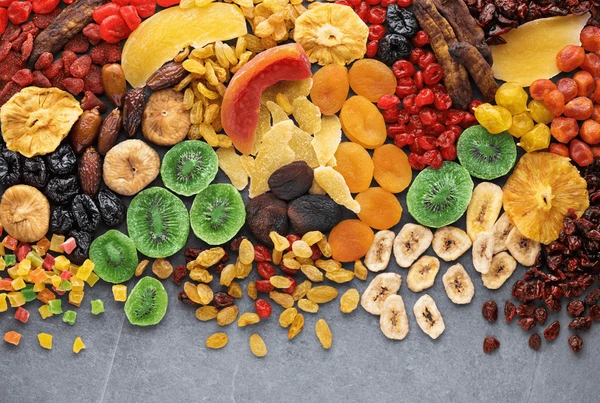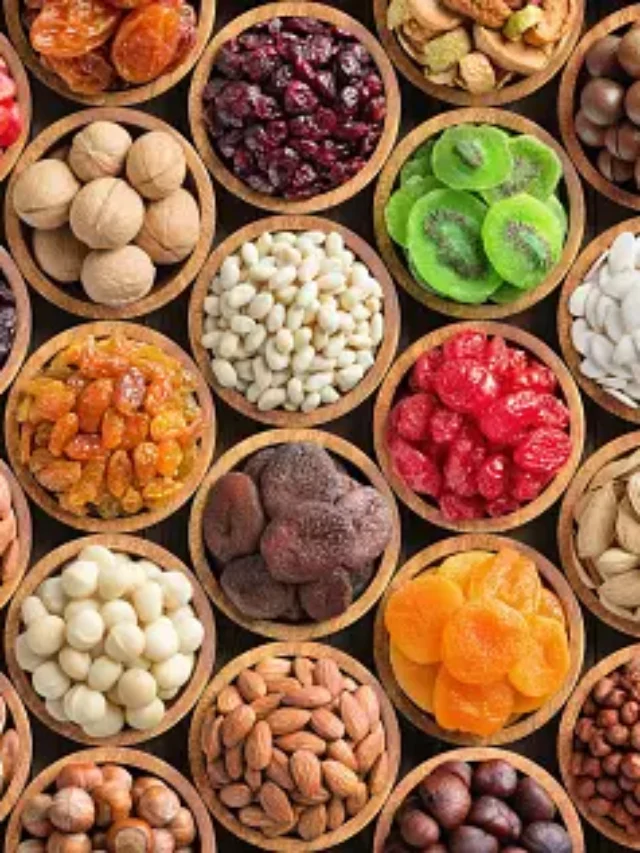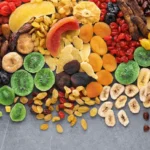Dry fruits are compact, nutrient-dense powerhouses that pack a punch when it comes to health benefits. From their origins to their diverse uses, these small snacks offer big advantages for our well-being. Let’s delve deeper into what makes dry fruits so special.
Table of Contents
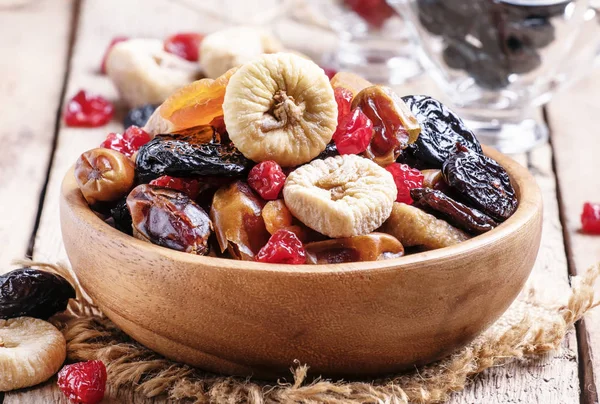
Origins and Varieties:
- Ancient Origins: Drying fruits is one of the oldest methods of food preservation, dating back to ancient civilizations. It allowed people to store fruits for long periods without refrigeration.
- Diverse Varieties: There are numerous types of dry fruits, including nuts (almonds, walnuts), dried berries (raisins, cranberries), stone fruits (apricots, dates), and exotic options (goji berries, dried figs).
Unique Nutritional Profile:
- Antioxidant Powerhouses: Dry fruits are rich in antioxidants like polyphenols, which help fight free radicals and reduce oxidative stress.
- Vitamin-Rich: They are concentrated sources of vitamins such as vitamin A, C, E, and several B vitamins, essential for various bodily functions.
- Mineral Content: Packed with minerals like calcium, iron, magnesium, and potassium, dry fruits support bone health, muscle function, and overall cellular processes.
Types of Dry Fruits:
- Almonds: Rich in vitamin E, magnesium, and fiber. They are great for heart health and can help regulate blood sugar levels.
- Raisins: Packed with iron, potassium, and antioxidants. They aid digestion and boost iron levels.
- Walnuts: Rich in antioxidants, protein, and omega-3 fatty acids. They improve mental health and reduce inflammation.
- Dates: Loaded with fiber, potassium, and magnesium. They promote healthy digestion and offer a rapid energy boost.
- Figs: Contain high levels of calcium, potassium, and fiber. They promote bone health and improve digestion.
- Apricots: Rich in vitamin A, vitamin C, and potassium. They help improve skin health and eye health.
Health Benefits:
- Heart Health: Many dry fruits, such as almonds and walnuts, contain healthy fats and antioxidants that help reduce bad cholesterol levels and improve heart health.
- Digestive Health: Dry fruits like prunes and figs are high in dietary fiber, which helps in maintaining a healthy digestive system and preventing constipation.
- Energy Boost: Dates and raisins provide a quick energy boost, making them ideal for a pre-workout snack.
- Bone Health: Calcium and potassium, which are necessary for strong and healthy bones, are abundant in figs and apricots.
- Skin and Hair Health: Dry fruits, particularly almonds that contain vitamin E, are rich in vitamins and antioxidants that support healthy skin and hair.
Tips for Including Dry Fruits in Your Diet:
- Snacking: Enjoy a handful of mixed dry fruits as a healthy snack.
- Breakfast: Add them to your morning oatmeal, yogurt, or cereal.
- Baking: Use them in baking recipes like cookies, muffins, and bread for added nutrition and flavor.
- Salads: Sprinkle chopped dry fruits over salads for a crunchy texture and a nutritional boost.
- Smoothies: Blend them into your smoothies for a natural sweetener and added nutrients.
Innovative Uses:
- Natural Sweeteners: Use dates or raisins as natural sweeteners in smoothies, desserts, and baking recipes instead of refined sugar.
- Homemade Energy Bars: Create your own energy bars or bites by combining dry fruits with nuts, seeds, and a touch of honey.
- Infused Water: Add dried fruits to water for a refreshing and nutrient-infused beverage.
Sustainable and Convenient:
- Sustainability Aspect: Drying fruits reduces food waste by extending the shelf life of fresh produce that might otherwise spoil.
- Convenience: Dry fruits are lightweight, non-perishable, and easy to carry, making them perfect for on-the-go snacking and travel.
Benefits of Dry Fruits for Kids
Dry fruits can be a fantastic addition to a child’s diet, offering a range of health benefits that support growth, development, and overall well-being. Here are some specific benefits of dry fruits for kids:
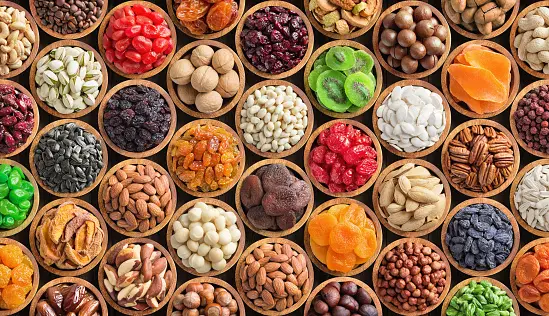
Nutrient-Rich Snack:
- Packed with Vitamins: Dry fruits are rich in essential vitamins such as vitamin A (important for vision and immune function), vitamin C (boosts immunity), and vitamin E (protects cells from damage).
- Mineral Boost: They provide vital minerals like calcium (for strong bones and teeth), iron (prevents anemia), and potassium (regulates muscle function).
Energy Boosters:
- Natural Energy: Dry fruits like dates, raisins, and apricots are excellent sources of natural sugars and carbohydrates, providing kids with a quick energy boost for their active lifestyles.
- Sustained Energy: The combination of fiber and healthy fats in dry fruits ensures a slow release of energy, keeping kids fueled for longer periods.
Supports Growth and Development:
- Bone Health: Calcium-rich dry fruits like figs and almonds contribute to the development of strong bones and teeth.
- Brain Development: Nuts such as walnuts are high in omega-3 fatty acids, which are crucial for brain development and cognitive function.
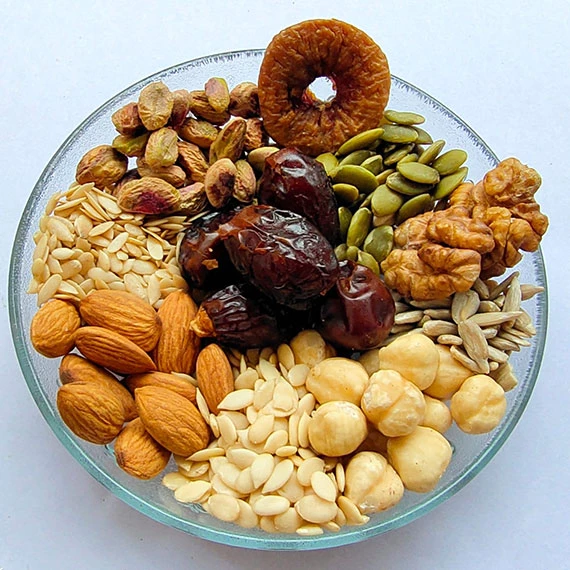
Digestive Health:
- Fiber-Rich: Dry fruits like prunes, figs, and dates are high in dietary fiber, which aids in digestion and helps prevent constipation, a common issue in children.
- Gut Health: The fiber in dry fruits also promotes a healthy gut microbiome, which is essential for overall health and immunity.
Immune System Support:
- Antioxidants: Dry fruits are packed with antioxidants that help strengthen the immune system and protect against illnesses.
- Vitamin C: Dry fruits like apricots and goji berries are rich in vitamin C, which is known to enhance immune function.
Healthy Weight Management:
- Nutrient Density: Dry fruits provide essential nutrients without adding excessive calories, helping maintain a healthy weight.
- Satiating: The fiber and healthy fats in dry fruits help keep kids full and satisfied, reducing the likelihood of unhealthy snacking.
Easy to Include in Diet:
- Versatile Snack: Dry fruits can be eaten on their own, mixed into yogurt or cereal, added to baked goods, or included in school lunchboxes.
- Convenient: They are non-perishable and easy to carry, making them a perfect snack option for busy families and kids on the go.
Fun Ways to Enjoy Dry Fruits:
- Trail Mix: Combine dry fruits with nuts and seeds to create a delicious and nutritious trail mix.
- Smoothies: Blend dry fruits into smoothies for added sweetness and nutrition.
- Homemade Bars: Make homemade energy bars using a mix of dry fruits, oats, and a touch of honey.
Here you can also take a look for Morning Coffee Tips – Enjoy your Brew with a sip of Coffee.
Conclusion
Dry fruits, the small but mighty snacks, are packed with a wealth of nutrients that offer big benefits for people of all ages, especially kids. These nutrient-dense powerhouses provide essential vitamins, minerals, and antioxidants that support growth, development, and overall well-being. From boosting energy levels and enhancing immune function to promoting healthy digestion and brain development, dry fruits are a versatile and convenient addition to any diet. Whether enjoyed as a standalone snack, mixed into meals, or used in creative recipes, dry fruits are an excellent way to ensure your child receives the necessary nutrients for a healthy, active lifestyle. Embrace the natural sweetness and health benefits of dry fruits to fuel your family’s journey to better health.
